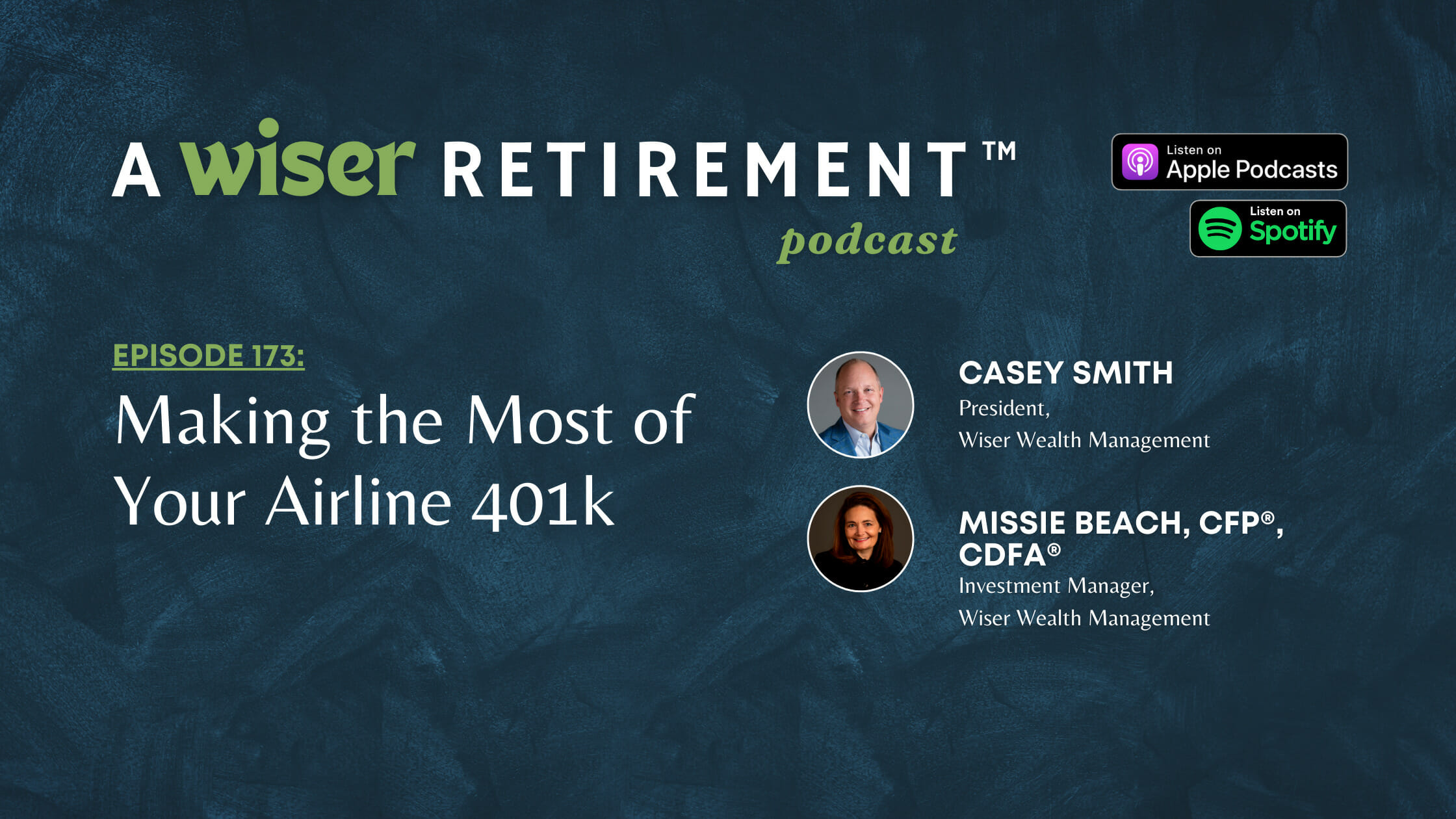
Making the Most of Your Airline 401(k)
On this episode of A Wiser Retirement™ Podcast, Casey Smith and Missie Beach, CFP®, CDFA® discuss airline 401(k) options for pilots, including the new Market-Based Cash Balance Plan for Delta Pilots.
Listen on Apple Podcasts or watch on YouTube:
SUMMARY:
Maximizing Contributions for Airline Pilots
Probably one third of our Clients at Wiser are airline pilots, but anyone who is saving into a 401(k) can learn and benefit from this episode. Recently, there has been a lot of talk in the airline industry about the Market Based Cash Balance Plan. However, we cannot talk about this specific plan, without first talking about 401(k) plans. 401(k) plans are fairly new, considering less than half a century ago everyone had pension plans. All of the major airlines have really good matching 401(k) policies. Beginning in 2024, Delta will offer its pilots a 17% match policy. Assuming you are younger than 50, once you reach a $250,000 salary with Delta, you cannot contribute any more to your 401k.
Once you are past this $250,000 salary mark as a pilot and making $300,000+ a year, that’s when the Market Based Cash Balance Plan comes into play. This plan allows you to continue to put your money into a separate 401(k). Delta manages the money as a pension through a third-party company. The return on this account is around 3%. You may think that a 3% return is not that attractive and maybe you can do better on your own. However, keep in mind that this allocation is made before taxes. On the other hand, any other investment you make with that money would be after taxes.
Another advantage of this plan, which is different from a pension, is that no matter what happens to Delta, the money is yours. In other words, if Delta ever files for bankruptcy, your money will still be there. Even though we have been focusing on Market Based Cash Balance Plan for Delta pilots, United pilots will soon benefit from this plan, as well.
Tax Duties as a Pilot
If you’re over the age of 35, starting with a Roth at a high-income level doesn’t make much sense because if you consider the 34% tax hit, it takes a long time to get back to the break-even point in your account. So, if you can let it all go in pre-taxed and let it grow and you pay tax on the other end, you tend to have more money at a certain age. On the contrary, that’s not necessarily the case for younger people because they have decades to make up for it, and then it becomes free income that keeps growing.
Therefore, what we like to recommend is visualizing your retirement savings in multiple buckets. Maybe you had a Roth in the past, but let’s assume you just get hired with nothing. Then, maybe in the first couple of years you could be doing all Roth, but after that, you’re going to switch to all pre-tax because that makes the most sense. Then, you should have excess income if you’re managing your money correctly. If you’re not living beyond your means, the Market Based Cash Balance Plan will grow with you. Additionally, that’s company money going in there.
A Pilot’s Opportunity Fund
In the end, you want to put any excess money into a brokerage account. We like to call this an opportunity fund. You can put money into an opportunity fund and build it up over time. Maybe it’s a second home, maybe that’s something else you want to do. Most pilots when they retire actually don’t want to move. More often than not they have big ideas in their 30s and early 40s, but by the time they hit 65, they’re tired and just want to stay home. Ultimately, there’s even the option of living off of your opportunity fund between ages the of 65 and 70 with very low tax responsibility. Therefore, if you look at it as a big picture, you can see that retirement savings don’t have to only be inside a 401k. You can create other non-tax or tax-efficient buckets. A tax-efficient ETF portfolio low-cost would be the way to approach it.
Do Not Allow Other Companies to Manage Your Brokerage Account
There has been a big push by some companies in our area to manage pilot’s brokerage accounts. If you are in your early 30s and get hired at any of these major airlines, you contribute money to these plans at a half a percent management fee you’re looking at over $2.5 million dollars in management fees, over the course of your career. On the other hand, all these company plans have low cost index funds, such as 0.3% in the Delta plan, which is basically free basically. Therefore, there is really no reason why you should ever hire someone to manage your airline 401k.
Download our eBook on “Buyer Beware: Why do they keep trying to sell you that annuity?”
TIMESTAMPS:
0:00 Intro
01:00 Maximizing Contributions for Airline Pilots
15:50 Tax Duties as a Pilot
17:00 A Pilot’s Opportunity Fund
19:35 Do Not Allow Other Companies to Manage your Brokerage Account
LINKS:
Learn more about Casey Smith and Missie Beach, CFP®, CDFA®
CONNECT:
Twitter, Instagram, Facebook, LinkedIn, and YouTube.
Learn more about A Wiser Retirement™ podcast and access previous episodes.
Share This Story, Choose Your Platform!
Wiser Wealth Management, Inc (“Wiser Wealth”) is a registered investment adviser with the U.S. Securities and Exchange Commission (SEC). As a registered investment adviser, Wiser Wealth and its employees are subject to various rules, filings, and requirements. You can visit the SEC’s website here to obtain further information on our firm or investment adviser’s registration.
Wiser Wealth’s website provides general information regarding our business along with access to additional investment related information, various financial calculators, and external / third party links. Material presented on this website is believed to be from reliable sources and is meant for informational purposes only. Wiser Wealth does not endorse or accept responsibility for the content of any third-party website and is not affiliated with any third-party website or social media page. Wiser Wealth does not expressly or implicitly adopt or endorse any of the expressions, opinions or content posted by third party websites or on social media pages. While Wiser Wealth uses reasonable efforts to obtain information from sources it believes to be reliable, we make no representation that the information or opinions contained in our publications are accurate, reliable, or complete.
To the extent that you utilize any financial calculators or links in our website, you acknowledge and understand that the information provided to you should not be construed as personal investment advice from Wiser Wealth or any of its investment professionals. Advice provided by Wiser Wealth is given only within the context of our contractual agreement with the client. Wiser Wealth does not offer legal, accounting or tax advice. Consult your own attorney, accountant, and other professionals for these services.





